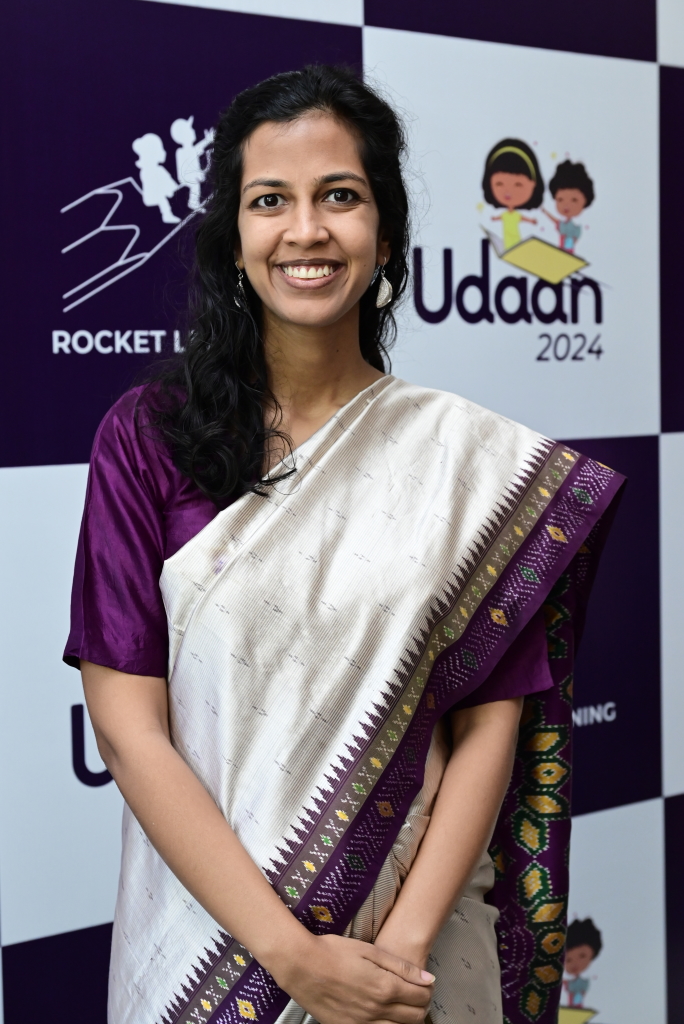 Go Back
Go BackShare
Innovative Partnerships in Education: The TicTacLearn – Rocket Learning Story
By CSF Editorial Team and Namya Mahajan
Aug 20, 2024
The collaboration between Rocket Learning (RL) and TicTacLearn (TTL) marks a strategic alignment of vision and innovation in education. By integrating TicTacLearn's content into Rocket Learning programmes, this partnership seamlessly combines creativity with educational rigor, driving substantial, large-scale impact across India. Hear from Namya Mahajan (Co-founder, Rocket Learning) on RL’s journey with TTL in this article.
The partnership between Rocket Learning (RL) and TicTacLearn (TTL) represents a strategic convergence of vision and innovation in education. By integrating TicTacLearn’s content into their programmes, Rocket Learning has elevated the quality and reach of foundational literacy and numeracy (FLN), while deepening student engagement. Together, they demonstrate a remarkable blend of creativity and educational rigour to drive meaningful, large-scale impact across India.

Q1 : TicTacLearn has reached over five crore beneficiaries since 2020 via state and 40+ NGO partners, including 21.5 lakh beneficiaries through Rocket Learning programmes, annually. Elaborate on Rocket Learning’s journey with TicTacLearn and the key factors that catalysed this partnership?
Both teams have embraced autonomy and ownership of their tasks, leading to a strong collaboration with clearly defined roles. This partnership is marked by a high level of openness, with both sides actively sharing and considering ideas and knowledge, enriching the content creation process. We have established thorough systems and processes for ideation, brainstorming and reviews, ensuring the production of high-quality content while maintaining a steady pace.
Additionally, there has been a shared commitment to producing educational assets that are both pedagogically sound and engaging for children in the age group of three to eight, with a willingness to accept different perspectives. This adaptability has allowed us to promptly address what works and what does not, leading to continuous improvements in content quality and production. These aspects have been crucial in driving the success of our partnership with TicTacLearn, ultimately benefiting many children through our programmes like Smart Anganwadi in Haryana, Uttar Pradesh and Chandigarh, E Aakar in Maharashtra, Mission Buniyaad in Rajasthan, E Pathshala in Delhi and Mission Aarambh in Uttarakhand.
Q2: TicTacLearn has been powering Rocket Learning’s FLN programmes with engaging learning content. What motivated you to partner with TicTacLearn and how has this integration impacted student learning outcomes and engagement in primary grades across India?
TicTacLearn is one of the most high quality online learning platforms, dedicated to producing content, especially for Indian parents and children from low-income families. For us, their ability to work together and modify their material to meet our requirements of providing contextual, relatable and flexible content has been essential.
With scenarios, characters and plots that subvert prejudices and stereotypes, TicTacLearn’s material is interesting and relatable. The material stays entertaining and realistic by striking a balance between reality and fantasy. Instead of just being taught right and wrong, children are portrayed as inquisitive learners who probe, experiment and pick up knowledge under the watchful eye of adults.
TicTacLearn’s design of characters is also considerate and inclusive. Among the eclectic cast of characters in the cartoon family are Smiley, a girl with disabilities; Roma, a tech-savvy mother and Happy Chacha, a devoted single father. By enabling viewers in our communities to recognise themselves in learning material, this depiction promotes holistic growth.
Parental engagement has increased significantly as a result of the content’s remarkable performance on websites like YouTube and WhatsApp. When combined with other special features of the Rocket Learning model, this excellent content has helped over 20 lakh children across Haryana, Uttar Pradesh, Chandigarh, Maharashtra, Rajasthan, Uttarakhand and Delhi to learn more and achieve better learning outcomes in India.
Q3: The TTL-Rocket Learning partnership has been providing engaging and high-quality learning experiences through innovative EdTech solutions, both in schools and at home. What opportunities and challenges have you encountered while integrating these solutions into your programmes?
For early childhood education (ECE), we believe that play-based, experiential learning is the best way to foster direct, in-person interactions between parents and children instead of having them spend time in front of devices.
At first, we were worried about the long hours children were spending glued to their parents’ smartphones. However, we also discovered that screens can effectively engage kids, particularly when they provide interesting stories. In order to counteract this, we now provide children with engaging and instructive content once a week, supporting their physical and socio-emotional growth while being closely monitored and guided by parents and other adult caregivers. With this strategy, we can include screen time while staying true to our moral principles and enrich the educational experience for our children.
Q4: How is the ECE and FLN landscape in India shaping up, particularly in context of access and quality? How can we ensure all children receive high-quality education?
The ECE and FLN landscape in India has seen improvement and gained momentum over the last few years. The Poshan Bhi Padhai Bhi programme under Saksham Anganwadi, Poshan 2.0 for Anganwadi centers and the updated Aadharshila curriculum framework are significant steps forward. Additionally, nationwide training for Anganwadi workers (AWWs) has been a key element of strengthening ECE in the country.
Exciting opportunities are also emerging for the birth-to-three age group, which is a critical period for brain development. Extending the continuum of learning to include this early phase can make a substantial difference in children’s educational outcomes during their foundational years when they learn to read so that they can read to learn later. Focussing on activity-based and play-based learning is crucial, as this is how children learn best, rather than rote learning.
The success of the Rocket Learning and TicTacLearn partnership reflects the transformative power of collaborative innovation in education. Parent participation, when combined with the strategic use of EdTech and deep involvement of the larger community members around, creates a powerful multiplier effect in children’s educational outcomes.
Keywords
Authored by
CSF Editorial Team
Namya Mahajan
Co-founder, Rocket Learning
Share this on
